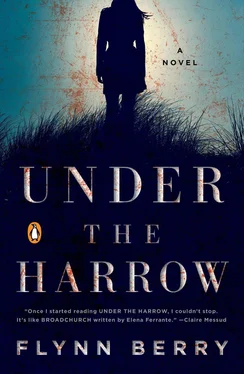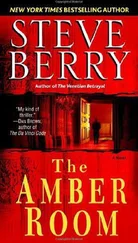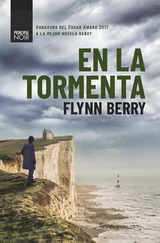Last night, I should have said one of Rachel’s friends took the dog. I should have read her notebook when Sarah went to the toilet, and I should not have asked her about Keith Denton. Rachel would have done a better job of this. She would have been patient and cunning.
The owner brings me toast and marmalade, the galette, and a French press of coffee. I consider my table and the room. This is why I like the Miller’s Arms better. The galette is crisp and savory. There are bright pink stalks of rhubarb on the counter. Every summer, wild rhubarb striped pink and white grows on Boar Lane. I open the book of German fairy tales.
In “The Six Swans,” a girl’s brothers are turned into swans for six years. If she speaks or laughs, they will remain swans forever. She sews them shirts and doesn’t speak even when she is accused of murdering her children. On the last day of the sixth year, the swans fly to her. She throws the shirts on them and they turn back into men. There is an illustration of the sixth brother. The girl didn’t finish his sleeve in time, so he has a swan wing in place of one arm.
• • •
Martha calls, and I talk to her outside under the yellow awning. “What are you doing? What’s your routine?” she asks. Five days have passed since the funeral.
“I don’t have a routine.”
“But what do you do there every day? How do you spend the time?”
I consider the awning, which is translucent, glowing with sunlight. I don’t want to tell her about Keith yet. “I do research. She was still looking for the man who attacked her, and I’ve picked up where she left off.”
“Is it useful?”
“I can’t tell.”
“What do the police think about your staying?”
“They want me to stay in the area. We talk often.”
“On the phone?” she asks, and then, without waiting for a response, she says, “How many times have they interviewed you?”
“Three or four, at the station. We’ve spoken a few times on the phone, but that’s not an interview.”
“What do you talk about?”
“The inquiry.”
“You know that’s not normal, don’t you? You should have a family liaison officer.”
“I do have one.” She left me a message the day after it happened, which I never returned.
“The lead detectives don’t usually keep the family updated.”
“How do you know?”
“Everyone knows that. Have they interviewed you under caution?”
“No.”
“Nora, do you think they’re investing time in you because they like you? Either you’re a suspect, or they think you know something that you’re not telling them.”
“I’m not a suspect. They need information about her for the victim profile.” I look across the road at the black shutters on the inn. “And I want to see if anyone in town does anything strange. Having me here might make him nervous.”
“If he’s there,” she says, “which most likely he isn’t.”
“Why would you say that?”
“You can’t be sure that he knew her.”
“He killed her dog. Why would he kill her dog unless he wanted to punish her?”
“I don’t know,” she says, and I can tell that she’s crying and trying to pretend that she isn’t. “If he were insane. That sounds like someone not in his right mind.”
• • •
It’s only ten thirty when I get back to my room. There are so many things to do. I should clear out Rachel’s house. I should organize her mortgage and bills. I should write notes to the people who sent flowers and wreaths to her funeral. I should earn money. I should open a new line of credit before my card reaches its limit. I should talk to a therapist or someone from Victim Support. Martha sent me a list of groups for the families of murder victims. There is one in Oxford, I should find out when it meets.
Instead I decide to go for a walk on the aqueduct. As I put on my boots, I notice a pile of white powder beside the dresser. In it are two larger pieces, and I recognize the handle and part of the base from the pitcher that used to stand on the dresser. Sometime in the night, I must have smashed it. I don’t remember this at all. I don’t know what I used to break it. I used to sleepwalk, the year after Rachel left home, when I was still in Snaith with our dad. I wonder what other changes are happening that I don’t know about.
I FORCE MYSELF NOT to walk past Keith’s house. I already have twice today, before and after the aqueduct. His home isn’t what I expected. I thought he would live in a house like the one where we grew up, a little plaster box built after the war, but number eleven Bray Lane is wooden, with shingles. The shingles are shaped like scallops and painted pale green. It looks like a house you’d see in a port in Denmark or Sweden.
The difficult part is going slowly. If Keith ever accuses me of following him, I have to be sure it makes him seem like the crazy one, the fixated one. All of my movements must seem natural, as though only a guilty person would notice them.
I decide to go to the grocer’s in Marlow, where at least there is a chance of running into him. It’s also practical. I can’t afford restaurants or takeaways, and I assume I can talk the girl at the Hunters into letting me leave a few things in the restaurant fridge.
I haven’t done the shopping since it happened. I remember going to the Tesco in Kilburn a few weeks ago, with all the other people who had just come up from the tube, who were also hungry and had just finished work, also buying supplies for dinner and a reward for getting through the day.
A woman lays her hand on my arm. I look down from the boxes of pasta, which I was considering, wondering if the girl at the Hunters would also let me use their hob. The woman has long, smooth hair and wears a green hunting jacket. I recognize her from walks on the aqueduct. She has two massive Newfoundlands.
I try to remember her name. Something soft and rainy and Home Counties. Was it Tamsin? I asked Rachel about her. “She looks so fresh,” I said, “and outdoorsy.” Blooming was the word, which I didn’t intend to tell Rachel.
Rachel snorted. “Not outdoorsy,” she said, “rich.”
Rachel told me that she has three children and lives in the Georgian stone house that you can partly see from the aqueduct, behind a thick hedgerow.
She glances down at my basket, and I feel a stricture loosen, a sort of sigh. This is exactly what I need. She will invite me over for dinner. Maybe, eventually, she will suggest I stay with them instead of at the Hunters. I could make myself useful. Watch the children, walk the dogs. Take care of the garden, obviously. My worry over my credit debt will fade. I remember looking through the hedgerow toward her house a few weeks ago and seeing trees full of yellow apples.
“I hope they find him soon,” she says. “I’m sick of being scared at night in my own house. Do you think it’s someone from her Hull days?”
“Rachel never lived in Hull.”
She looks at me like I am lying. “Where was it again?”
I recognize her tone. It is the voice my clients in London use when something in their garden has died or been knocked over in a storm, and they ask me to remind them of how much they paid for it.
“We grew up in Snaith.”
“That’s near Hull, isn’t it?”
I tip a box of wagon wheels into my basket. “Why are you scared at night?” I ask.
“Because—”
“She died at four in the afternoon,” I say. “You stupid bitch.”
I step around her and carry my shopping to the till. None of you protected her, I think as I walk away from her down the aisle. It was probably one of you and the rest of you didn’t see it and you let it happen.
Читать дальше












